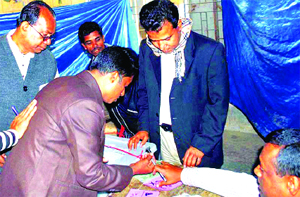M. Shahidul Islam
It’s an error in judgment that had destroyed the image of the ruling Awami League (AL) government, perhaps irreversibly. The similar error had led to the AL’s sordid sojourn into oblivion in the mid-1970s, which took many decades to recuperate.
An entrenched state of stoicism seems to have engulfed this age-old political outfit vertically and horizontally. The party has forgotten its glorious past and is engaged in an outburst of destructive emotionalism that can neither evolve with the demands of the time, nor can see anything beyond today.
But the AL of the bygone days did see beyond the horizon and fashioned policies and parameters to pull the nation forward. The AL and its predecessor parties acted in the 1940s and the 50s to craft an enlightened vision that proved as timelier as they were farsighted.
Sher– e -Bagla AK Fazlul Hoque’s mooting of the historic Lahore Resolution, and the consequent birth of the two nation theory gave birth of Pakistan from which Bangladesh emerged. Moulana Bashani, one of the main pioneers of the AL, sought independence from Pakistan as early as in 1948. Sheikh Mujib fashioned his six points demand in 1966 to meet the aspiration of a nation that was being colonized and deprived by the civil-military oligarchs of Pakistan.
Besides, the AL of the past was never afraid of election and it fought an historic election in 1954 in alliance with others. Today’s AL is averse to fair election; it’s also explicitly power-obsessed and dependent more on external dictats than on the mandate of the people.
Destructive emotions unleashed
Like the city council elections in 2013, main opposition parties BNP and the Jamat- e- Islami (JI) are emerging victorious in the ongoing Upozilla elections too, despite there being too many instances of musclemen-ship and administrative influence peddling by ruling party stalwarts. The JP of HM Ershad seems to have been consigned to the dustbin of history by voters; proving anew that substance, not theatrics that matters most in any leadership.
This reality is known to the AL and that is precisely why Sheikh Hasina, her teammates and some external powers blindly stuck to backing the AL in its unyielding stance toward avoiding a general election under a caretaker government, which the main opposition parties demanded persistently and for which 1000s of people died.
Instead, the stoicism-gripped AL decided to unleash its destructive emotionalism through an orgy of state-sponsored killing, kidnapping, incarceration and other inhuman persecutions of opposition leaders and activists. In the process, the AL managed to cling onto power, till now, but it’s credibility, legality and the locus standi as a democratic political organ has withered away.
The regime of Sheikh Hasina is now under pressure from all the democratic Western governments to go for a dialogue with the main opposition BNP and its allies, to arrange a re-election sooner, and to instill stability that is so much in need to sustaining a flaying economy and social cohesiveness.
Bangladesh’s GDP has doubled and had surpassed US$100 billion. But average income per capita rose by barely 20%. This has created a lopsided social stratification in which wealth has been amassed by a hybrid bunch from the so called middle and upper classes that can afford to live on investment and assets while the majority subsisting on income alone has been allowed to drift to the abyss of hopelessness. These toiling multitudes are the ones that suffer the most during political anarchy and economic downturns.
Social cleavages & Al-Qaeda threat
If this cleavage is vertical, a horizontal one too is visible in the manner this social evolution had occurred. Roughly about 15 million expatriate workers have been injecting much needed funds to individual families at the lower and middle classes while the oligarchs within have thrived on the kinds of businesses, rent-seeking and industrial entrepreneurship which has not yet managed to create even 10 million jobs within.
The inextricable nexus between the thriving oligarchs and the coercive coterie of political leadership lay at the center of peoples’ disgust against politics and political leaders and the increased disenfranchisement of the majority from the political process. The same reason carries an explication for why democracy has become a mockery of the few who only wants to rule, and rule by force only.
This vacuous, vexing political ambiance can lead to anything too detrimental to bear. The latest message from the Al-Qaeda leader Aiman al Jawhari is the first major threat to Bangladesh and it came as an awakening call to the ‘Muslims of Bangladesh’ to wage a holy war against what Jawhari termed as ‘imperialist India and its stooge Hasina regime.’
It’s time to ask: Could Jawhari make such a call if the January 5 polling was fair, participatory and inclusive? Not even remotely, for true democracy is impenetrable armour that can protect a nation like a mother protecting her babies.
The Al-Qaeda and the likes anchor themselves in countries where the political regime is unrepresentative, repressive and flawed. They capitalize on the collective emotions of people who are under quasi or real occupation of non-Muslim rulers and countries. They pounce upon on those rulers who serve the interests of external powers more than taking care of the well being of their own people.
The ongoing Upozilla election and the AL-Qaeda threats are emitting invaluable signals to the ruling AL, and to those linked to the repressive state machinery, that the time is up. Unless a credible democratic system can be installed sooner, Bangladesh’s sovereignty will vanish gradually and the nation will turn into a failed entity. Should that be allowed to happen, no amount of blame – gaming will save the nation from the kinds of struggle being waged by Al-Qaeda and the many others of similar vintages.
Source: Weekly Holiday










